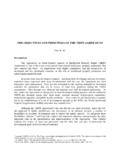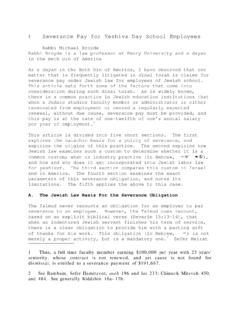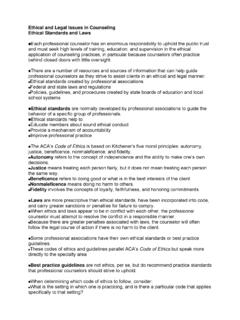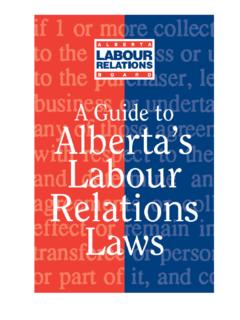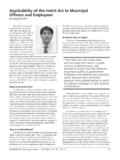Transcription of CONFLICT OF LAWS ISSUES IN INTERNATIONAL …
1 CONFLICT OF laws ISSUES IN INTERNATIONAL copyright CASES By Peter K. Yu Introduction Today, one can easily subscribe to a German newspaper, order a Swedish magazine, listen to a Russian radio broadcast over the Internet or purchase a French movie video from a Canadian retail store. However, when asked which law would govern those transactions, most people, including even experienced lawyers, would have a very difficult time answering this question. Due to the varying levels of wealth, economic structures, technological capabilities, political systems and cultural traditions, different countries have different copyright laws .
2 What is protected under law may not be protected under Brazilian law. What is legal within the United States may be illegal in China. The Berne Convention and the TRIPs (Trade-Related Aspects of Intellectual Property Rights) Agreement attempt to harmonize copyright laws around the world. However, these multilateral conventions have yet to create a uniform intellectual property regime under which all member countries have identical copyright laws . In fact, there remains wide disagreement among countries regarding ISSUES such as moral rights, fair use, duration of copyright , protection in data, rights in sound recordings, exhaustion of rights, work-for-hire arrangement and, most recently, circumvention of encryption technologies and Internet service provider liability.
3 Extraterritorial Application of copyright Law In Equal Employment Opportunity Commission v. Arabian American Oil Co., the United States Supreme Court, in 1991, held that federal statutes are not to be construed to apply to conduct abroad absent clear congressional intent to that effect. Thus, courts are generally reluctant to apply copyright laws to infringing activities abroad unless there is direct infringement within the United States. Commentators have attributed this reluctance to the territorial nature of copyright laws , the principle of national sovereignty, concerns about INTERNATIONAL comity, and considerations for separation of powers.
4 A case in point is the 1994 case of Subafilms, Ltd. v. MGM-Pathe Communications Co. In this case , Subafilms and Hearst Corporation sued MGM/UA for unauthorized distribution abroad of The Beatles s Yellow Submarine. Interpreting the copyright Act as conferring rights no further than the national border, the Court of Appeals for the Ninth Circuit held that merely authorizing infringing acts within the United States did not violate domestic copyright law. After Subafilms, however, several courts declined to follow the Ninth Circuit s decision, maintaining that the court had ignored economic reality and the incentive scheme created by the copyright clause of the Constitution.
5 On the one hand, extraterritorial application of domestic copyright law could create more incentives by effectively protecting copyrighted works abroad. On the other hand, such application would enable courts to remove loopholes in the copyright Act. In light of the global transformation that has occurred in the New Economy, more courts likely would decline to follow the Ninth Circuit s ruling. Instead, they may attempt to find some connection between the infringing activities and the United States so that application of law would be justified. Two Interpretations of the National Treatment Principle As a member of the Berne Convention for the Protection of Literary and Artistic Works, the United States abides by the principle of national treatment.
6 Under this principle, a member state must protect the work of foreign authors the same way as it protects the work of its own authors. Thus, whatever law applies to a domestic work will also apply to a foreign work. When Congress enacted the Berne Convention Implementation Act of 1988, it stated explicitly that the Berne Convention is not self-executing. Thus, in resolving a CONFLICT -of- laws question in an INTERNATIONAL copyright case , courts must look to the copyright Act. Because the Act does not contain any choice-of-law provision, courts must look elsewhere to resolve the CONFLICT -of- laws question. There are generally two different views regarding the meaning of national treatment in the CONFLICT -of- laws context.
7 The late Professor Melville Nimmer, author of the leading treatise on copyright law, maintained that national treatment is a choice-of-law provision. Under his interpretation, national treatment dictates that the applicable law is the law of the state in which the infringement occurred. This applicable law governs all elements of the infringement action, regardless of the nationality of the author, the country of origin of the copyrighted work or the place of first publication. While Professor Nimmer was undoubtedly the leading authority in copyright law, such an interpretation is unconvincing, for it would result in multiple ownership laws and a change of ownership every time the work crosses a country s border.
8 Thus, some commentators and courts have rejected his interpretation. Instead, they consider national treatment as a non-discrimination device, restricting a country s ability to enact laws that treat domestic authors more favorably than foreign authors. Resolving Choice-of-Law Questions Under the alternative interpretation, different laws may apply to different elements of the infringement action: Originality. In Feist Publications, Inc. v. Rural Telephone Service Co., the United States Supreme Court, in 1991, made it clear that originality is a constitutional requirement, thus implying that courts will not be able to apply the more lenient originality standard of a foreign country in any copyright case .
9 This implication was well-illustrated by the interesting development in the 1998 case of Bridgeman Art Library, Ltd. v. Corel Corp. in the Southern District of New York. In that case , the court initially misapplied British law to determine whether the subject matter met the originality requirement for copyright protection. Upon reconsideration, the court corrected itself by conceding that law governed the originality issue . Subject Matter. There is virtually no case law on this issue . However, section 104 of the copyright Act, which lists the various conditions under which a foreign work attains copyright protection in the United States, seems to suggest that copyright in a work is initially vested in the country of origin and is subsequently recognized by other countries through treaty obligations.
10 Thus, courts must consider both domestic copyright law and the relevant treaty provisions to determine the substantive law governing the subject matter issue . Ownership. The ownership issue was addressed in the 1998 case of Itar-Tass Russian News Agency v. Russian Kurier, Inc. In this case , several Russian journalists sued a New York-based Russian newspaper for allegedly infringing upon the copyright in their newspaper and magazine articles which were originally published in Russia. After examining the two different interpretations of national treatment, the Court of Appeals for the Second Circuit held that national treatment is not a choice-of-law provision.
